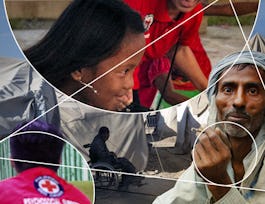NCDs are the leading cause of death in almost every region of the world, and place a huge burden on individuals, families and societies. Humanitarian settings have a negative effect on the levels of disease, and the possibility of treatment. The importance of NCDs in global health is acknowledged by their inclusion in the Sustainable Development Goals, which call for a reduction of a third in premature mortality from NCDs by 2030. However, NCDs have until recently received little attention in humanitarian settings, leaving prevention, care and treatment needs largely unaddressed among some of the most vulnerable populations. According to the World Health Organization, 70 percent of global deaths are due to NCDs. The four main disease groups which cause the greatest number of deaths are cardiovascular disease, cancer, diabetes and chronic obstructive pulmonary disease (including asthma).


Non-Communicable Diseases in Humanitarian Settings
Taught in English
Some content may not be translated
4,253 already enrolled
(105 reviews)
Skills you'll gain
Details to know

Add to your LinkedIn profile
9 quizzes
See how employees at top companies are mastering in-demand skills


Earn a career certificate
Add this credential to your LinkedIn profile, resume, or CV
Share it on social media and in your performance review

There are 3 modules in this course
In module one you will learn about why NCDs have increased in the world as a whole and about why NCDs are a particular problem in humanitarian emergencies or crises. Natural disasters and complex emergencies including armed conflict may have a negative effect, both on the levels of disease, and on the possibilities for preventing, treating or caring for people with NCDs.
What's included
6 videos7 readings3 quizzes
In module two you will learn about some of the basic approaches of humanitarian action and how they might that apply to NCDs. This would include basic concepts, and how they might help or hamper the response to NCDs.
What's included
4 videos9 readings3 quizzes
In module three you will learn about prioritization (the classical first priority for health response to save lives, and concentrate on excess mortality and morbidity), the importance of risk analysis (the risk equation), the challenges involved in transition from acute to longer term assistance – from blueprint to contextualizing and building capacity – as well as about longer term budgetary issues.
What's included
4 videos7 readings3 quizzes
Instructor

Offered by
Recommended if you're interested in Public Health

University of Copenhagen

Universitat de Barcelona

Hebrew University of Jerusalem

Emory University
Why people choose Coursera for their career




Learner reviews
Showing 3 of 105
105 reviews
- 5 stars
80.95%
- 4 stars
19.04%
- 3 stars
0%
- 2 stars
0%
- 1 star
0%
New to Public Health? Start here.

Open new doors with Coursera Plus
Unlimited access to 7,000+ world-class courses, hands-on projects, and job-ready certificate programs - all included in your subscription
Advance your career with an online degree
Earn a degree from world-class universities - 100% online
Join over 3,400 global companies that choose Coursera for Business
Upskill your employees to excel in the digital economy
Frequently asked questions
Access to lectures and assignments depends on your type of enrollment. If you take a course in audit mode, you will be able to see most course materials for free. To access graded assignments and to earn a Certificate, you will need to purchase the Certificate experience, during or after your audit. If you don't see the audit option:
The course may not offer an audit option. You can try a Free Trial instead, or apply for Financial Aid.
The course may offer 'Full Course, No Certificate' instead. This option lets you see all course materials, submit required assessments, and get a final grade. This also means that you will not be able to purchase a Certificate experience.
When you purchase a Certificate you get access to all course materials, including graded assignments. Upon completing the course, your electronic Certificate will be added to your Accomplishments page - from there, you can print your Certificate or add it to your LinkedIn profile. If you only want to read and view the course content, you can audit the course for free.
You will be eligible for a full refund until two weeks after your payment date, or (for courses that have just launched) until two weeks after the first session of the course begins, whichever is later. You cannot receive a refund once you’ve earned a Course Certificate, even if you complete the course within the two-week refund period. See our full refund policy.


